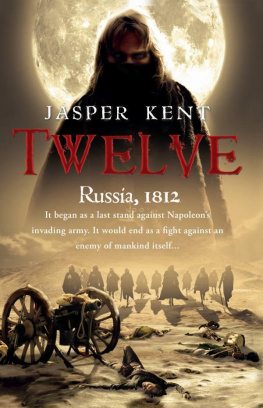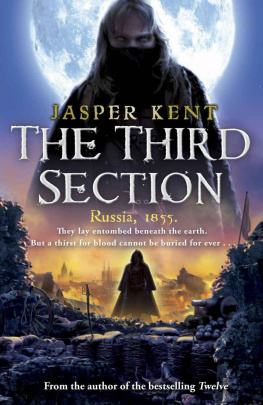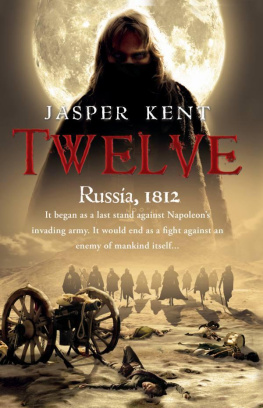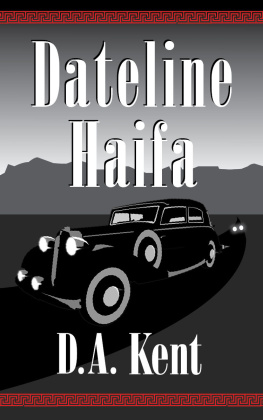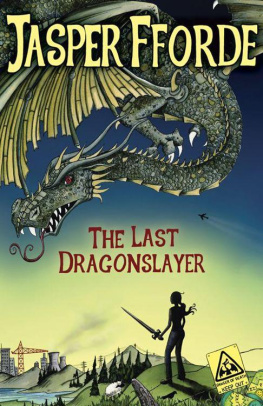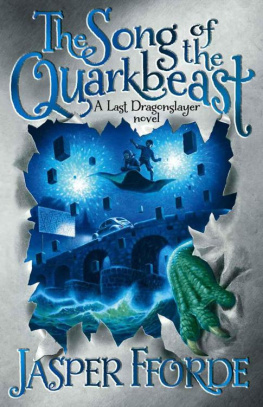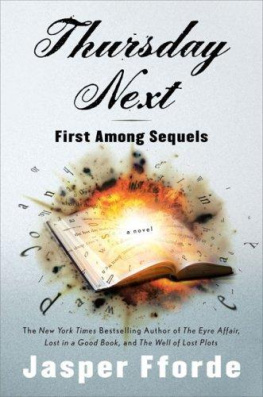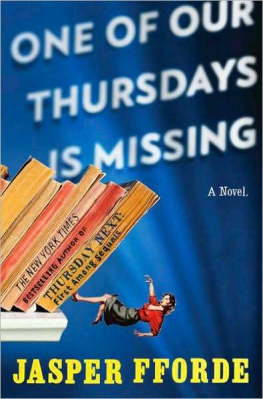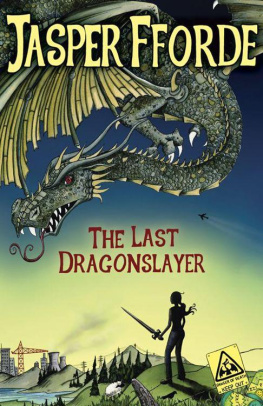Jasper Kent - Twelve
Here you can read online Jasper Kent - Twelve full text of the book (entire story) in english for free. Download pdf and epub, get meaning, cover and reviews about this ebook. year: 2010, publisher: Prometheus Books, genre: Detective and thriller. Description of the work, (preface) as well as reviews are available. Best literature library LitArk.com created for fans of good reading and offers a wide selection of genres:
Romance novel
Science fiction
Adventure
Detective
Science
History
Home and family
Prose
Art
Politics
Computer
Non-fiction
Religion
Business
Children
Humor
Choose a favorite category and find really read worthwhile books. Enjoy immersion in the world of imagination, feel the emotions of the characters or learn something new for yourself, make an fascinating discovery.
- Book:Twelve
- Author:
- Publisher:Prometheus Books
- Genre:
- Year:2010
- Rating:5 / 5
- Favourites:Add to favourites
- Your mark:
- 100
- 1
- 2
- 3
- 4
- 5
Twelve: summary, description and annotation
We offer to read an annotation, description, summary or preface (depends on what the author of the book "Twelve" wrote himself). If you haven't found the necessary information about the book — write in the comments, we will try to find it.
Twelve — read online for free the complete book (whole text) full work
Below is the text of the book, divided by pages. System saving the place of the last page read, allows you to conveniently read the book "Twelve" online for free, without having to search again every time where you left off. Put a bookmark, and you can go to the page where you finished reading at any time.
Font size:
Interval:
Bookmark:
Born in 1968, Jasper Kent has a degree in Natural Sciences from Trinity Hall, Cambridge, and works as a freelance software consultant. He has also written several musicals. He lives in Brighton.
www.rbooks.co.uk
For more information on Jasper Kent and his books,
see his website at www.jasperkent.com
This eBook is copyright material and must not be copied, reproduced, transferred, distributed, leased, licensed or publicly performed or used in any way except as specifically permitted in writing by the publishers, as allowed under the terms and conditions under which it was purchased or as strictly permitted by applicable copyright law. Any unauthorised distribution or use of this text may be a direct infringement of the author's and publisher's rights and those responsible may be liable in law accordingly.
ISBN 9781407041100
Version 1.0
www.randomhouse.co.uk
TRANSWORLD PUBLISHERS
6163 Uxbridge Road, London W5 5SA
A Random House Group Company
www.rbooks.co.uk
First published in Great Britain
in 2008 by Bantam Press
an imprint of Transworld Publishers
Copyright Jasper Kent 2008
Jasper Kent has asserted his right under the Copyright,
Designs and Patents Act 1988 to be identified as
the author of this work.
This book is a work of fiction and, except in the case of historical fact, any resemblance to actual persons, living or dead, is purely coincidental.
A CIP catalogue record for this book
is available from the British Library.
ISBN: 9781407041100
Version 1.0
This electronic book is sold subject to the condition that it shall not by way of trade or otherwise, be lent, resold, hired out, or otherwise circulated without the publisher's prior consent in any form other than that in which it is published and without a similar condition including this condition being imposed on the subsequent purchaser
Addresses for Random House Group Ltd companies outside the UK
can be found at: www.randomhouse.co.uk
The Random House Group Ltd Reg. No. 954009
2 4 6 8 10 9 7 5 3 1
For
S.L.P.
Distances
A verst is a Russian unit of distance, slightly greater than a kilometre.
Dates
During the nineteenth century, Russians based their dates on the old Julian Calendar, which in 1812 was twelve days behind the Gregorian Calendar used in Western Europe. All dates in the text are given in the Russian form and so, for example, the Battle of Borodino is placed on 26 August, where Western history books have it on 7 September.
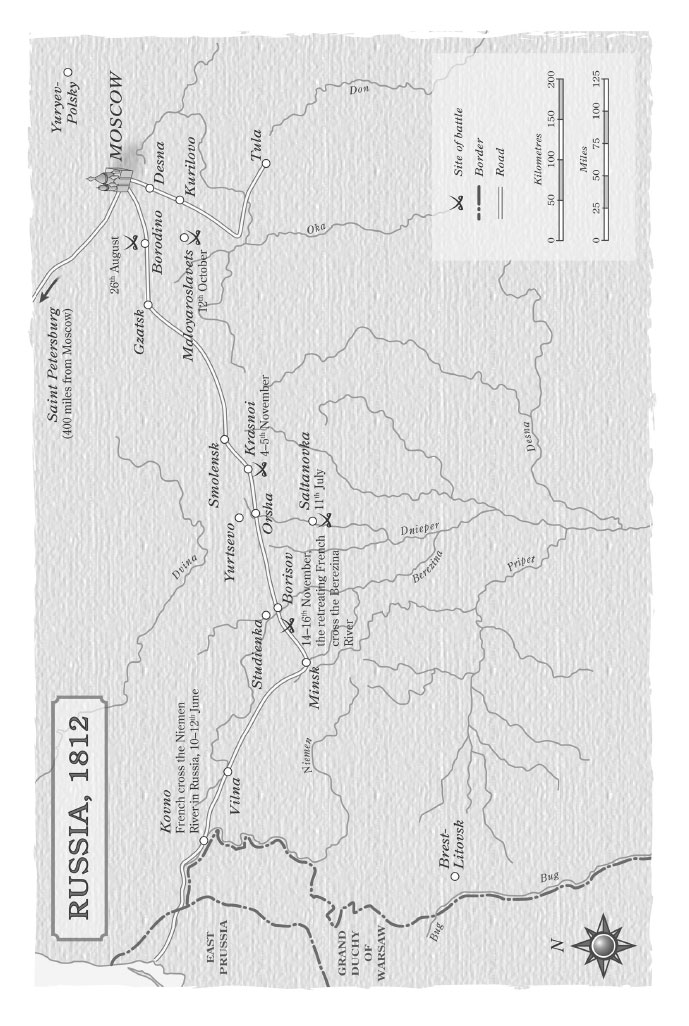
Some people place this story in the town of Atkarsk, others in Volgsk, but in most versions it's Uryupin and so that is where we will keep it. All versions agree that the events occurred sometime in the early years of the reign of the great Tsar Pyetr and all agree that the town in question was infested by a plague of rats.
Rats always came to Uryupin in the summer, taking grain and bringing disease, but the people of the town, like those of any town, had learned to survive the summer months, comfortable in the knowledge that the cold of winter would kill off most of the verminous creatures not completely wipe them out perhaps, but at least reduce their numbers so that the next summer would be no worse than the last.
But although the winters had of late been as cold as one might expect in Uryupin, they had had scant effect on the size of the rat population. The number emerging in spring seemed little fewer than there had been the previous autumn, and the number each autumn was three times what it had been in spring. By the third summer the rats were everywhere and the people of the town came up with a desperate solution. They would abandon Uryupin; leave it for the rats to feed in until there was nothing left for them to feed on. Then the rats would starve and the people, after a year or two, could return.
Before the plan could be carried out, late in July of that year, a merchant arrived in the town. He was not Russian but, as far as the people of Uryupin could tell, a European. He told the people that he had heard of their problem and that he could help. He had arrived with a simple wagon, pulled by a tired mule and covered with a great cloth, so that no one could see what was inside.
The merchant said that what he had in his wagon would kill every rat in the town and that if this did not prove to be the case he would not take a single copeck in payment. The leaders of the town asked what it was that the merchant had inside his wagon, but he would not show them until they agreed his price. Few in Uryupin had much appetite for the plan of abandoning the town and many had openly declared it to be madness, so the merchant needed to do little persuading before his alternative was accepted.
He dramatically (some versions of the story say ostentatiously) pulled off the cloth covering his wagon to reveal a cage; a cage containing monkeys about a dozen of them. They had been placid in the darkness under the cloth, but as soon as the light hit them they began to scream and tear at the bars that confined them, reaching through as if to attack the onlookers who had crowded round.
The monkeys were not big, perhaps up to a man's knee, although their hunched posture made them appear smaller than if they had been standing fully upright. Their bodies, but for the palms of their hands and the soles of their feet, were covered in black fur, topped with a white ruff around the neck. Their heads were the heads of old men: fleshy, wrinkled skin, without a single hair. Some said they were more vultures than monkeys.
The merchant opened the cage and the monkeys ran out into the town. On the ground they moved on all fours with most of their weight on their hind legs, their knuckles barely grazing the earth, but soon they were using both arms and legs to climb up the sides of barns or down into cellars. Within minutes they had disappeared.
The people of the town waited. The merchant had warned them to keep their dogs and cats safe at home, since the monkeys were none too discriminating about their prey. Most kept their children at home too, reasoning that if one of these creatures could kill a full-grown dog, then why not a baby or an infant?
With no children playing and with the adults praying for success, the town might have been quiet, but such quietness as they enjoyed was continually broken by the screeching of a monkey as it found another rat. The ecstatic scream as one leapt upon its victim could cut through the town at any time of day or night, emanating from a cellar or from a loft or from behind a wall. No one saw the merchant's pets at work, but all could hear that they were working.
And soon, within a week, the people did begin to notice that there were fewer rats. The tenth day was the last on which a rat was ever sighted, foraging amongst the bins of pig feed, oblivious to the fate of its brothers and sisters; the fate that it was soon to meet.
The town's leaders were thankful. They offered the merchant what he had asked and half as much again. But the merchant refused to take anything.
'The task is not yet complete,' he explained. 'My friends have not yet returned and will not return until there is nothing more for them to eat.'
Sure enough, though the people of Uryupin saw no more rats, they still heard the screaming of the monkeys at work, although now it seemed to come not from the cellars and the barns, but from the trees and the hedgerows. Rats are devious creatures, the people reasoned, and so no one was much surprised that the last survivors would find such unusual places to hide.
Font size:
Interval:
Bookmark:
Similar books «Twelve»
Look at similar books to Twelve. We have selected literature similar in name and meaning in the hope of providing readers with more options to find new, interesting, not yet read works.
Discussion, reviews of the book Twelve and just readers' own opinions. Leave your comments, write what you think about the work, its meaning or the main characters. Specify what exactly you liked and what you didn't like, and why you think so.

